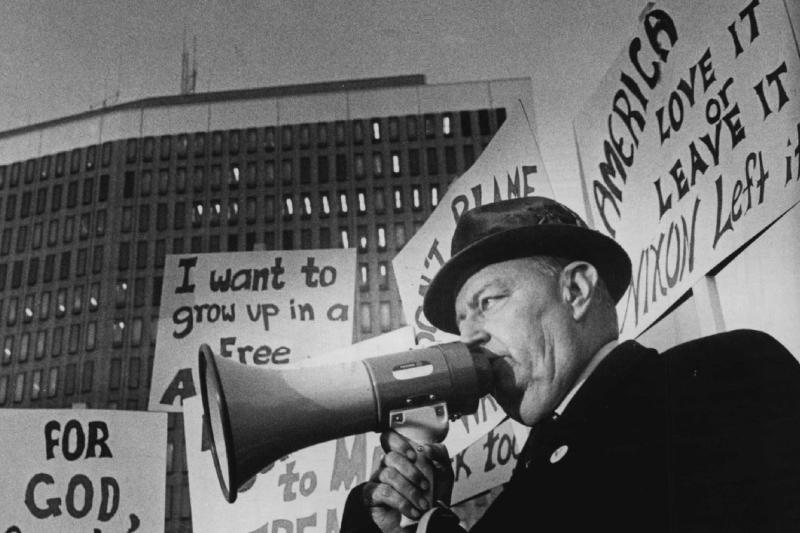Politics: Partisan Media and the Talk-Radio Revolution
By: Barton Swaim (WSJ)



Modern American conservatism has always been a collaboration between intellectuals and fulminators. Every time conservatism generates a populist uprising—the Hardhat Riot of 1970, the rise of talk radio in the early 1990s, the Tea Party revolt of 2009, the election of Donald Trump in 2016—liberal commentators lament the takeover of a once-noble movement of writers and scholars by a horde of benighted hooligans. But the strain of insurgent populism has been there from the beginning.
Consider Paul Matzko's "The Radio Right: How a Band of Broadcasters Took on the Federal Government and Built the Modern Conservative Movement" (Oxford, 304 pages, $34.95). Mr. Matzko, a historian and editor with the Cato Institute, wants to correct the customary account of conservatism's origins, in which a gang of conservative intellectuals associated with William F. Buckley Jr. and his National Review magazine challenged the dominance of Northeastern liberal elites beginning in the late 1950s. This etiology, Mr. Matzko contends, gives too much credit to midcentury eggheads (my term, not his) and not enough to a group of scrappy right-wing radio broadcasters. Chief among them were Carl McIntire, a New Jersey-based minister in the Bible Presbyterian Church and host of the "Twentieth Century Reformation Hour"; Billy James Hargis, a fundamentalist evangelist in Oklahoma and host of the "Christian Crusade" radio program; and Texas oilman H.L. Hunt, proprietor of the "Life Line" radio program.
These programs, which came to prominence in the 1950s, were fiercely anticommunist, suspicious of labor unions, opposed to cultural progressivism and soft on Southern segregationism. Taken together, Mr. Matzko contends, conservative radio shows reached far more people than any intellectual magazine. In 1964 National Review had around 73,000 subscribers, whereas McIntire's radio program counted about 20 million listeners.
"The Radio Right," however, is only partly about American conservatism's origins; it's also the story of how powerful liberal politicians used the federal government to punish their critics. Day after day in the early 1960s, McIntire, Hargis et al. inveighed against the Kennedy administration for, as they saw it, vacillating in the face of Soviet communism. In response, President Kennedy and his brother Robert hatched a plot with another pair of brothers, the progressive labor leaders Victor and Walter Reuther. The "Reuther Memorandum," as it's known, recommended having the Internal Revenue Service target the broadcasters with audits, and urged the Federal Communications Commission to selectively compel stations that ran right-wing programs to give equal airtime to opposing points of view under the Fairness Doctrine.
Mr. Matzko writes with clarity and wit, and supplies evidence showing that the Reuther scheme came from the Oval Office. The plan was carried out by the Kennedy and Johnson administrations—and it worked. In one FCC regulation promulgated in 1967, stations airing attacks on "the honesty, character, integrity or like personal qualities of an identified person or group" were required to notify that person or group within a week of the broadcast and supply a copy of the tape or transcript. Much easier, many stations concluded, to drop the program.
In the ’70s and ’80s the FCC backed away from the Fairness Doctrine, and in 1987 the agency terminated the policy altogether. That allowed for the renaissance of conservative talk radio, a medium in which Matt Drudge continues to play a central, if mysterious, role. His news aggregator website, the Drudge Report, has for more than two decades determined what conservative radio hosts talk about on any given day.
Mr. Drudge can’t accurately be called a conservative, but, like the reactionary radio populists of the ’50s and ’60s, he seems to despise whatever the cultural and corporate elite say is good for America. Although the man behind the Drudge Report is famously reclusive, Matthew Lysiak has written a snappy and absorbing semibiography in “The Drudge Revolution: The Untold Story of How Talk Radio, Fox News, and a Gift Shop Clerk With an Internet Connection Took Down the Mainstream Media” (BenBella, 261 pages, $26.95).
Mr. Drudge made his name in Hollywood as the author of an industry-gossip email newsletter. He reported, for example, that Connie Chung had been fired by “CBS Evening News” before anybody in traditional media—possibly even Ms. Chung—knew it. It takes no great talent to pass along uncorroborated rumors; Mr. Drudge’s innovation lay in (a) passing them along at lightning-fast speed and (b) scooping mainstream news outlets on major stories about which many liberal outlets showed, for reasons you can guess, a lack of curiosity. He achieved global fame, as readers may remember, when in 1998 he revealed the details of Monica Lewinsky’s taped conversations with Linda Tripp. Newsweek would have been the first to publish those details, but its editors killed the story and Mr. Drudge heard about the killing.
Mr. Lysiak has interviewed scores of Mr. Drudge’s onetime friends and associates. The material from these interviews, rather than the author’s discussions of his subject’s role in the news industry and American politics, are what make the book work. Mr. Drudge has always been—how to put it?—unusual. At Montgomery Blair High School in Silver Spring, Md., a suburb of Washington, he would wear his trademark fedora and carry a copy of the New York Times under his arm. His grades were abysmal; on principle he refused to apply himself and would read the Times in class. At night, recalls one friend, he would go to the gay bars of Washington and dance like a maniac for hours.
In recent years, having surmised, probably correctly, that his friends liked him mainly for his hyperlinks, Mr. Drudge has guarded his privacy with increasing fervor. He might spend two weeks in Tel Aviv or Helsinki, then off to Washington or somewhere in Australia. “They are stalking me,” he once told a friend, “so I’m hiding out in Poland.” By “they” he meant Bill and Hillary Clinton. Weird stuff—although if the Clintons are anything like the Kennedys, Mr. Drudge might have a point.



